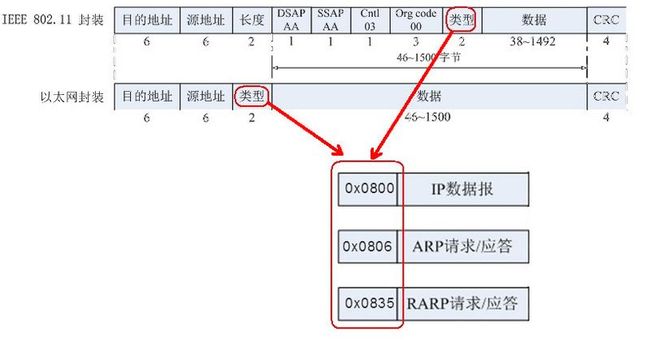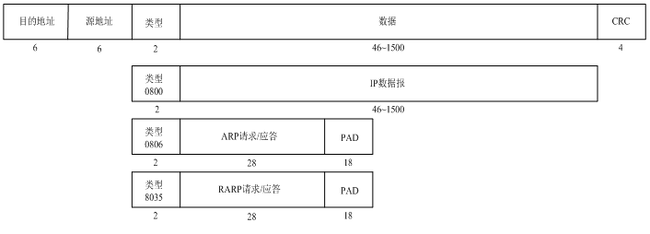Linux网络编程——原始套接字实例:MAC 头部报文分析
通过《Linux网络编程——原始套接字编程》得知,我们可以通过原始套接字以及 recvfrom( ) 可以获取链路层的数据包,那我们接收的链路层数据包到底长什么样的呢?
链路层封包格式
MAC 头部(有线局域网)
注意:CRC、PAD 在组包时可以忽略
链路层数据包的其中一种情况:
1 unsigned char msg[1024] = { 2 //--------------组MAC--------14------ 3 0xb8, 0x88, 0xe3, 0xe1, 0x10, 0xe6, // dst_mac: b8:88:e3:e1:10:e6 4 0xc8, 0x9c, 0xdc, 0xb7, 0x0f, 0x19, // src_mac: c8:9c:dc:b7:0f:19 5 0x08, 0x00, // 类型:0x0800 IP协议 6 // …… …… 7 // …… …… 8 };
接收的链路层数据包,并对其进行简单分析:
1 #include <stdio.h> 2 #include <string.h> 3 #include <stdlib.h> 4 #include <sys/socket.h> 5 #include <netinet/in.h> 6 #include <arpa/inet.h> 7 #include <netinet/ether.h> 8 9 int main(int argc,char *argv[]) 10 { 11 int i = 0; 12 unsigned char buf[1024] = ""; 13 int sock_raw_fd = socket(PF_PACKET, SOCK_RAW, htons(ETH_P_ALL)); 14 while(1) 15 { 16 unsigned char src_mac[18] = ""; 17 unsigned char dst_mac[18] = ""; 18 //获取链路层的数据帧 19 recvfrom(sock_raw_fd, buf, sizeof(buf),0,NULL,NULL); 20 //从buf里提取目的mac、源mac 21 sprintf(dst_mac,"%02x:%02x:%02x:%02x:%02x:%02x", buf[0], buf[1], buf[2], buf[3], buf[4], buf[5]); 22 sprintf(src_mac,"%02x:%02x:%02x:%02x:%02x:%02x", buf[6], buf[7], buf[8], buf[9], buf[10], buf[11]); 23 //判断是否为IP数据包 24 if(buf[12]==0x08 && buf[13]==0x00) 25 { 26 printf("______________IP数据报_______________\n"); 27 printf("MAC:%s >> %s\n",src_mac,dst_mac); 28 }//判断是否为ARP数据包 29 else if(buf[12]==0x08 && buf[13]==0x06) 30 { 31 printf("______________ARP数据报_______________\n"); 32 printf("MAC:%s >> %s\n",src_mac,dst_mac); 33 }//判断是否为RARP数据包 34 else if(buf[12]==0x80 && buf[13]==0x35) 35 { 36 printf("______________RARP数据报_______________\n"); 37 printf("MAC:%s>>%s\n",src_mac,dst_mac); 38 } 39 } 40 return 0; 41 }
记得以管理者权限运行程序:
每个报文头部都有一个相应的结构体,通过这些结构体对报文进行相应的组包或拆包会方便很多。
ubuntu 12.04 中描述网络协议结构的文件如下:
以太网头部(所需要头文件:#include <net/ethernet.h>):
上面的例子,改为用结构体实现,如下:
1 #include <stdio.h> 2 #include <string.h> 3 #include <stdlib.h> 4 #include <sys/socket.h> 5 #include <netinet/in.h> 6 #include <arpa/inet.h> 7 #include <netinet/ether.h> 8 #include <net/ethernet.h> // 以太网头部 头文件 9 #include <netinet/ip.h> // ip头部 头文件 10 // #include <net/if_arp.h> // arp头部 头文件 11 12 int main(int argc,char *argv[]) 13 { 14 int i = 0; 15 unsigned char buf[1024] = ""; 16 int sock_raw_fd = socket(PF_PACKET, SOCK_RAW, htons(ETH_P_ALL)); 17 while(1) 18 { 19 unsigned char src_mac[18] = ""; 20 unsigned char dst_mac[18] = ""; 21 //获取链路层的数据帧 22 recvfrom(sock_raw_fd, buf, sizeof(buf),0,NULL,NULL); 23 24 //从数据中提取mac首部信息(14个字节) 25 struct ether_header *ethdr = NULL; 26 ethdr = (struct ether_header *)buf; 27 28 //从buf里提取目的mac、源mac 29 sprintf(dst_mac,"%02x:%02x:%02x:%02x:%02x:%02x", ethdr->ether_dhost[0], ethdr->ether_dhost[1],ethdr->ether_dhost[2],ethdr->ether_dhost[3],ethdr->ether_dhost[4],ethdr->ether_dhost[5]); 30 sprintf(src_mac,"%02x:%02x:%02x:%02x:%02x:%02x", ethdr->ether_shost[0], ethdr->ether_shost[1],ethdr->ether_shost[2],ethdr->ether_shost[3],ethdr->ether_shost[4],ethdr->ether_shost[5]); 31 32 //判断是否为IP数据包 33 if( 0x0800 == ntohs(ethdr->ether_type) ) 34 { 35 printf("______________IP数据报_______________\n"); 36 printf("MAC:%s >> %s\n",src_mac,dst_mac); 37 38 }//0x0806为ARP数据包, 0x8035为RARP数据包 39 else if( 0x0806 == ntohs(ethdr->ether_type) || 0x8035 == ntohs(ethdr->ether_type) ) 40 { 41 printf("______________ARP数据报_______________\n"); 42 printf("MAC:%s >> %s\n",src_mac,dst_mac); 43 } 44 45 } 46 return 0; 47 }
转自:http://blog.csdn.net/tennysonsky/article/details/44751997





